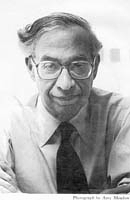
Donald Allen Wollheim was an American science fiction editor, publisher, writer, and fan. As an author, he published under his own name as well as under pseudonyms, including David Grinnell, Martin Pearson, and Darrell G. Raynor.

Damon Francis Knight was an American science fiction author, editor, and critic. He is the author of "To Serve Man", a 1950 short story adapted for The Twilight Zone. He was married to fellow writer Kate Wilhelm.

Ace Books is a publisher of science fiction (SF) and fantasy books founded in New York City in 1952 by Aaron A. Wyn. It began as a genre publisher of mysteries and westerns, and soon branched out into other genres, publishing its first science fiction title in 1953. This was successful, and science fiction titles outnumbered both mysteries and westerns within a few years. Other genres also made an appearance, including nonfiction, gothic novels, media tie-in novelizations, and romances. Ace became known for the tête-bêche binding format used for many of its early books, although it did not originate the format. Most of the early titles were published in this "Ace Double" format, and Ace continued to issue books in varied genres, bound tête-bêche, until 1973.
"The Last of the Masters" is a science fiction novelette by American writer Philip K. Dick. The original manuscript of the story was received by the Scott Meredith Literary Agency on July 15, 1953, and the story was published by the Hanro Corporation in the final issue of Orbit Science Fiction in 1954. It has since been reprinted in several Philip K. Dick story collections, beginning with The Golden Man in 1980.
Charles Leonard Harness was an American science fiction writer.

Miles John Breuer was an American physician and science fiction writer of Czech origin. Although he had published elsewhere since the early 20th century, he is considered the part of the first generation of writers to appear regularly in the pulp science fiction magazines, publishing his first story, "The Man with the Strange Head", in the January 1927 issue of Amazing Stories. His best known works are "The Gostak and the Doshes" (1930) and two stories written jointly with Jack Williamson, "The Girl from Mars" (1929) and The Birth of a New Republic (1931).

The Moon Goddess and the Son is a science fiction novel by American writer Donald Kingsbury, published by Baen in 1986. The novel was an expanded version of a novella published in the December 1979 issue of Analog magazine, which was a nominee for the Hugo Award for Best Novella in 1980.
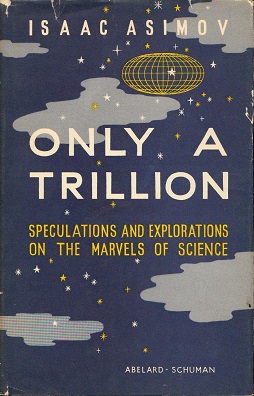
Only a Trillion is a collection of ten science essays and three scientific spoof articles by Isaac Asimov. It was the first collection of science essays published by Asimov. It was first published by Abelard-Schuman in 1957. A paperback edition published by Ace Books in 1976 included updates of outdated material. The book was also published under the title Marvels of Science by Collier Books in 1962.

Science Fiction Quarterly was an American pulp science fiction magazine that was published from 1940 to 1943 and again from 1951 to 1958. Charles Hornig served as editor for the first two issues; Robert A. W. Lowndes edited the remainder. Science Fiction Quarterly was launched by publisher Louis Silberkleit during a boom in science fiction magazines at the end of the 1930s. Silberkleit launched two other science fiction titles at about the same time: all three ceased publication before the end of World War II, falling prey to slow sales and paper shortages. In 1950 and 1951, as the market improved, Silberkleit relaunched Future Fiction and Science Fiction Quarterly. By the time Science Fiction Quarterly ceased publication in 1958, it was the last surviving science fiction pulp magazine, all other survivors having changed to different formats.
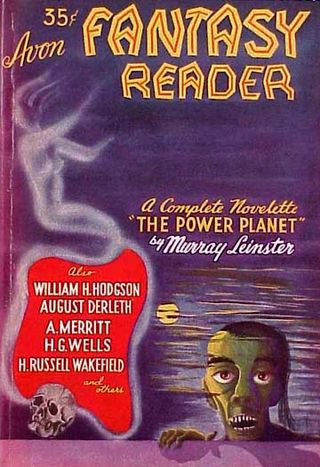
Avon published three related magazines in the late 1940s and early 1950s, titled Avon Fantasy Reader, Avon Science Fiction Reader, and Avon Science Fiction and Fantasy Reader. These were digest size magazines which reprinted science fiction and fantasy literature by now well-known authors. They were edited by Donald A. Wollheim and published by Avon.

The Annual World's Best SF was a series of annual paperback anthologies published by American company DAW Books from 1972 to 1990 under the editorship of publisher Donald A. Wollheim and Arthur W. Saha from 1972 to 1990. Some volumes were also issued in hardcover through the Science Fiction Book Club. It was a continuation of the earlier anthology series World's Best Science Fiction, edited by Wollheim and Terry Carr, published from 1965 to 1971 by Ace Books DAW also issued the companion series The Year's Best Horror Stories from 1971 to 1994, and The Year's Best Fantasy Stories from 1975 to 1988.

The 1972 Annual World's Best SF is an anthology of science fiction short stories edited by Donald A. Wollheim and Arthur W. Saha, the initial volume in a series of nineteen. It was one of two follow-up volumes to the previous year's World's Best Science Fiction: 1971 edited by Wollheim and Terry Carr for Ace Books, the other being Carr's The Best Science Fiction of the Year. The Wollheim/Saha title was first published in paperback by DAW Books in May 1972, followed by a hardcover edition issued in July of the same year by the same publisher as a selection of the Science Fiction Book Club. For the hardcover edition the original cover art of John Schoenherr was replaced by a new cover painting by Frank Frazetta. The paperback edition was reissued by DAW in December 1977 under the variant title Wollheim's World's Best SF: Series One, this time with cover art by John Berkey.

The 1974 Annual World's Best SF is an anthology of science fiction short stories edited by Donald A. Wollheim and Arthur W. Saha, the third volume in a series of nineteen. It was first published in paperback by DAW Books in May 1974, followed by a hardcover edition issued in September of the same year by the same publisher as a selection of the Science Fiction Book Club. For the hardcover edition the original cover art of Jack Gaughan was replaced by a new cover painting by Victor Valla. The paperback edition was reissued by DAW in December 1979 under the variant title Wollheim's World's Best SF: Series Three, this time with cover art by Vicente Segrelles. A British hardcover edition was published by The Elmfield Press in October 1975 under the variant title The World's Best SF Short Stories No. 1.
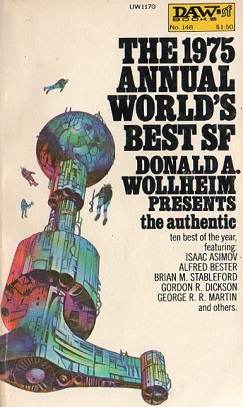
The 1975 Annual World's Best SF is an anthology of science fiction short stories edited by Donald A. Wollheim and Arthur W. Saha, the fourth volume in a series of nineteen. It was first published in paperback by DAW Books in May 1975, followed by a hardcover edition issued in September of the same year by the same publisher as a selection of the Science Fiction Book Club. For the hardcover edition the original cover art of Jack Gaughan was replaced by a new cover painting by Richard V. Corben. The paperback edition was reissued by DAW in December 1980 under the variant title Wollheim's World's Best SF: Series Four, this time with cover art by Vicente Segrelles. A British hardcover edition was published by The Elmfield Press in November 1976 under the variant title The World's Best SF Short Stories No. 2.

World's Best Science Fiction: 1971 is an anthology of science fiction short stories edited by Donald A. Wollheim and Terry Carr, the seventh volume in a series of seven. It was first published in paperback by Ace Books in 1971, followed by a hardcover edition issued in September of the same year by the same publisher as a selection of the Science Fiction Book Club. It was followed in 1972 by The 1972 Annual World's Best SF, edited by Wollheim, and The Best Science Fiction of the Year, edited by Carr, the first volumes of two separate successor series,

World's Best Science Fiction: 1970 is an anthology of science fiction short stories edited by Donald A. Wollheim and Terry Carr, the sixth volume in a series of seven. It was first published in paperback by Ace Books in 1970, followed by a hardcover edition issued in September of the same year by the same publisher as a selection of the Science Fiction Book Club and a British hardcover edition issued in November of the same year by Gollancz.

The Many Worlds of Andre Norton is a collection of fantasy and science fantasy short stories by American writer Andre Norton, edited by Roger Elwood. It was first published in August 1974 in simultaneous hardcover editions by Chilton (US) and Thomas Nelson (Canada). A paperback edition, retitled The Book of Andre Norton and omitting the name of the editor, was issued by DAW Books in October 1975, and was reprinted in November 1977, July 1981 and September 1987.
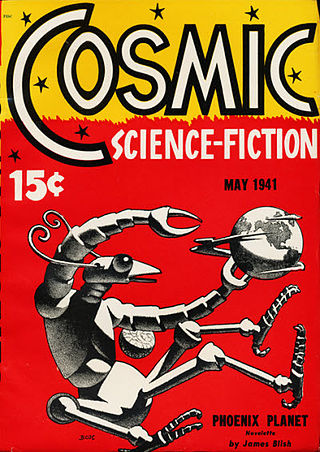
Cosmic Stories and Stirring Science Stories were two American pulp science fiction magazines that published a total of seven issues in 1941 and 1942. Both Cosmic and Stirring were edited by Donald A. Wollheim and launched by the same publisher, appearing in alternate months. Wollheim had no budget at all for fiction, so he solicited stories from his friends among the Futurians, a group of young science fiction fans including James Blish and C. M. Kornbluth. Isaac Asimov contributed a story, but later insisted on payment after hearing that F. Orlin Tremaine, the editor of the competing science fiction magazine Comet, was irate at the idea of a magazine that might "siphon readership from magazines that paid", and thought that authors who contributed should be blacklisted. Kornbluth was the most prolific contributor, under several pseudonyms; one of his stories, "Thirteen O'Clock", published under the pseudonym "Cecil Corwin", was very successful, and helped to make his reputation in the field. The magazines ceased publication in late 1941, but Wollheim was able to find a publisher for one further issue of Stirring Science Stories in March 1942 before war restrictions forced it to close again.

Two Complete Science-Adventure Books was an American pulp science fiction magazine, published by Fiction House, which lasted for eleven issues between 1950 and 1954 as a companion to Planet Stories. Each issue carried two novels or long novellas. It was initially intended to carry only reprints, but soon began to publish original stories. Contributors included Isaac Asimov, Robert A. Heinlein, Arthur C. Clarke, Poul Anderson, John Brunner, and James Blish. The magazine folded in 1954, almost at the end of the pulp era.
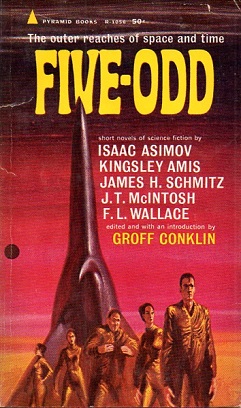
Five-Odd is an anthology of science fiction novelettes edited by Groff Conklin. It was first published in paperback by Pyramid Books in August 1964; it was reprinted in June 1971. The first British edition was published under the alternate title Possible Tomorrows in hardcover by Sidgwick & Jackson in June 1972; a paperback edition was issued by Coronet under the same title in September 1973. It was later gathered together with the Donald A. Wollheim-edited anthology Trilogy of the Future into the omnibus anthology Science Fiction Special 9.

















